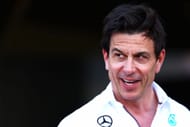Mercedes boss Toto Wolff feels that track limits are needed at the Red Bull Ring circuit, while his Red Bull counterpart Christian Horner thinks it made the sport look amateurish. The duo had contrasting opinions on the subject as they spoke to Sky Sports F1 after the Austrian GP.
Speaking about the subject of track limit violations and their policing, Horner said:
“I think the track limits thing need to be looked at because it makes us look a little bit amateurish. With so many good drivers making those… breaking those limits, it’s just too easy. I think it’s something that needs to be looked at here for next year. Either the kerbs or maybe a bit of gravel on the other side of the kerb would just tidy that up, but I think, with all those penalties coming through, it’s very tough for the drivers.”
In contrast, Mercedes' executive director Wolff stat:
“I think, no, the stewards are doing their job. It’s what the rules say. I think we’ve either got to go back to the sausage kerb and take into consideration that teams and drivers shouldn’t complain if they break their cars because that’s clear. Or you’ve just gotta let everybody go where they want. That’s the other solution as they do in some of the races in the United States.”
According to the FIA, there were around 1,200 instances where drivers had violated track limits during the Austrian GP. Along with the stewards, the regulatory body had to penalize eight drivers after the race, which significantly impacted the overall race result.
Apart from podium-sitters Max Verstappen, Charles Leclerc, and Sergio Perez, majority of the drivers were penalized. While Perez was the only Red Bull driver who had suffered the impact of the track limit violation during the race, Horner empathised with all the drivers whose race results were compromised.
In contrast, Mercedes team boss Wolff felt that the stewards were following the rules and regulations and it was a fair call.
Seven-time champion Lewis Hamilton also suffered the impact of a five-second penalty during the race and a further 10-second penalty after the race.
Mercedes boss proposes to remove track limits completely

Suggesting the addition of sausage kerbs onto the circuits or removing the track limits entirely, Toto Wolff empathised with the frustration among the fans, teams, and drivers.
The Mercedes chief felt that FIA had tried their best to enforce the rules properly but the situation that transpired was disappointing and frustrating for drivers, teams, and fans. He believes there is a need to find a solution to track limit violations which can be implemented in the future.
Speaking to the on-site media after the race, the Mercedes executive director said:
“Everybody really is in the worst possible situation, with the regulations and the race-track and the FIA trying to enforce them to the best of their ability. There are cameras and sensors and they spent some time looking at it, and we did the same back at base, looking at all of the onboards just to make sure that we weren't penalised versus all the other teams.
"But for the fans, teams, and drivers, it is super frustrating to keep those penalties coming, but there's only two solutions. You can either come back to sausage kerbs and break the drivers and the cars, or just remove [track limits] overall and let them race the fastest line. We need to find a solution for the interest of the track, which is a super and traditional track, and for the stakeholders because we want to achieve spectacular racing that is not influenced by penalties given for the right reasons.”
The Mercedes drivers Lewis Hamilton and George Russell had crossed the finish line in seventh and eighth place respectively. However, with the sleuth of penalties after the race, Hamilton got demoted to eighth place, whereas Russell was promoted to seventh place.
Their customer teams McLaren and Aston Martin had also outperformed them on track, adding more frustration to their dismal weekend. Heading to Silverstone, the Brackley team is looking forward to the race, which is a home race for both their drivers.